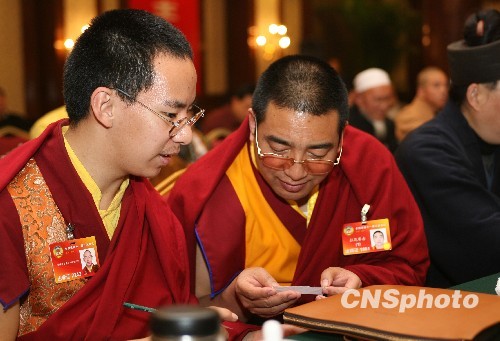11th Panchen Lama makes debut
The 11th Panchen Lama has made debut in China's political arena as a political advisor at the ongoing annual session of the National Committee of Chinese People's Political Consultative Conference (CPPCC) in Beijing.
 |
|
The 11th Panchen Lama (left) at the ongoing annual session of the CPPCC |
"This is the first time for me to attend the CPPCC meeting as a new member, so I will learn from other members," he told Xinhua while joining a panel discussion of the religious circle of the CPPCC National Committee Thursday.
A day earlier, he attended the opening meeting of the Third Session of the 11th CPPCC National Committee, the country's top political advisory body.
During the two-hour panel discussion from 9 a.m. to 11 a.m. Thursday, he took notes from time to time when other members spoke and sometimes exchanged a few words with others around him, but he did not take the floor.
During the break of the panel discussion, many other members came to chat, take photos and shake hands with him, and he kept smiling in an amicable manner.
"I have shouldered the mission of safeguarding national unity and ethnic solidarity since I was enthroned (in 1995). Now, such a sense of responsibility is becoming even stronger," he told Xinhua.
Tenpai Nyima, a CPPCC member from Tibet's Nyingchi Prefecture, said he felt very delighted to see the appearance of the 11th Panchen Lama, although he did not speak at the panel discussion.
"He is an outstanding leader of Tibetan Buddhism as well as our glory and pride," he said.
The 11th Panchen Lama, Bainqen Erdini Qoigyijabu, one of the two most senior living Buddhas in Tibetan Buddhism, became a CPPCC member on Feb. 28. Earlier on Feb. 3, he was elected vice president of the Buddhist Association of China.
"Although he is young, he is mature and diligent, and he has increasingly profound Buddhist attainments and a growing popularity in Tibetan-inhabited regions," said Padma, a CPPCC member from northwestern Qinghai Province.
"I believe he can carry forward the fine tradition of the 10th Panchen Lama in loving the nation, the religion and the people, and in safeguarding the national unity and ethnic solidarity," he said.
The 11th Panchen Lama, with the secular name Gyaincain Norbu, was born in February 1990 in Lhari County, in northern Tibet's Nagqu Prefecture.
He was approved by the central government as the reincarnation of the 10th Panchen Lama in November 1995 after a lot-drawing ceremony among three candidates in the Jokhang Temple in Lhasa.
Over the past years, he has given head-touching blesses to hundreds of thousands of believers, and ardently participated in public welfare activities.
After the deadly riot broke out in the Tibet's regional capital of Lhasa on March 14, 2008, he strongly condemned the violence, saying that it ran counter to Buddhist tenets.
He also presided over a prayer meeting in Beijing on May 21, 2008, in which he prayed for peace in Wenchuan in southwestern Sichuan Province and neighboring areas struck by an 8-magnitude on May 12.
On March 28, 2009, he unexpectedly delivered a speech in English at the opening ceremony of the Second World Buddhist Forum in Wuxi City of eastern Jiangsu Province, winning applause and appreciation.
In the speech, he used Buddhist sutras to give enlightenment to believers about how to deal with various threats facing modern society -- such as environmental degradation, wealth gap, financial crisis, terrorist attacks, and taught believers to do more deeds beneficial to others.
"He is very bright and becoming more and more knowledgeable. I believe he is capable of further promoting Buddhism," said Shingtsa Tenzinchodrak, a living Buddha from Tibet's Shannan Prefecture, also a deputy to the National People's Congress, the country's top legislature.
To Kelsang Drokar, a villager from the Tarma Village in the suburbs of Lhasa, 11th Panchen Lama's new position as a CPPCC member made him and his fellow villagers very happy.
"We hope he can bring more blessings and benefits to our people of Tibetan ethnic group," he said.
 0
0 







Go to Forum >>0 Comments